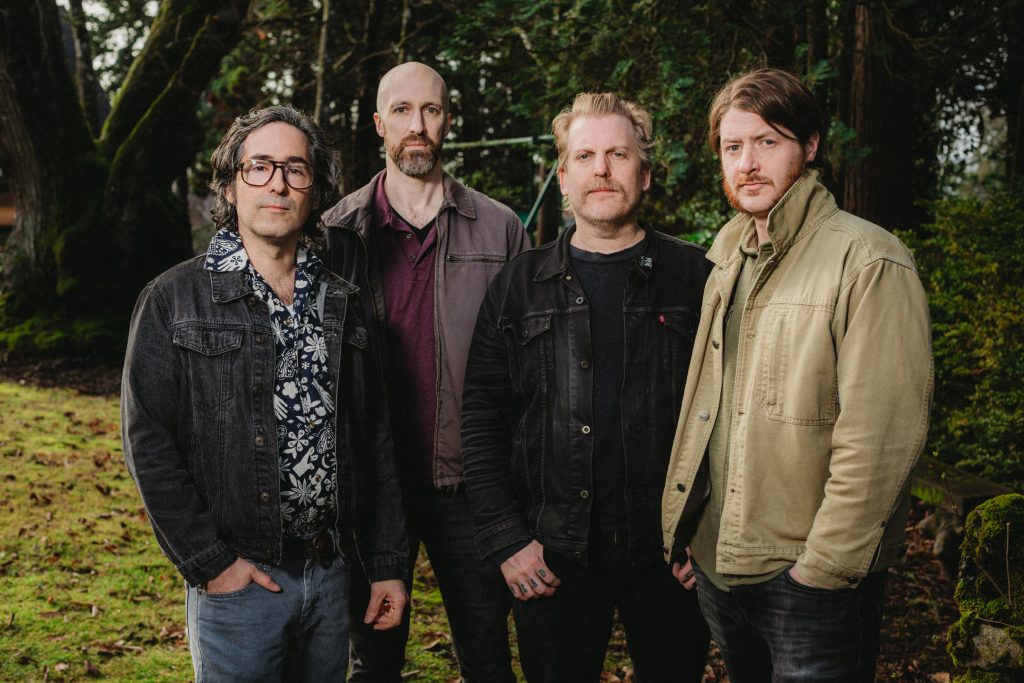
There are numbers so vast they exceed the scope of human reckoning, concepts so immeasurable they surpass our capacity to understand. On their radiant new album, 100’s of 1000’s, Millions of Billions, Blitzen Trapper make peace with the unknowable, surrendering themselves to forces beyond their control as they explore the infinite with a broad mind and an open heart.
Inspired by singer/songwriter Eric Earley’s fascination with Buddhist texts and meditation (the title comes from a phrase that appears over and over in the Mahayana sutras), the album offers a captivating take on rebirth and transcendence, and the circularity of existence, navigating its way through the space beyond dreams and reality, beyond gods and mortals, beyond life and death. The songs here are as sincere as they are surreal, rooted in rich character studies and deep reflection, and unfolding like a riddle-filled journey that asks many questions and offers no answers. The production is intoxicating to match, blending lo-fi intimacy and trippy psychedelia into a mesmerizing swirl of analog and electronic sounds. Add it all together and the result is a gorgeous, sprawling collection wrapped in lush layers of synthesizers and washed out electric guitars–a poignant, expansive exploration of perception and purpose that manages to look both forwards and backwards all at once.
“This whole project grew out of a box of old four-track tapes from the ’90s that I found recently,” Earley explains of 100’s of 1000’s, Millions of Billions. “The tapes were full of songs I’d written and recorded back when I was 19 or 20 years old, and the sound and the spirit of those recordings got me excited to start writing music again, to go back to working the way I did when I was first starting out.”
Launched roughly two decades ago in Portland, OR, Blitzen Trapper garnered early attention with a series of self-released albums before breaking out internationally with a pair of critically acclaimed LPs (2007’s Wild Mountain Nation and 2008’s Furr) that would cement their status at the forefront of the modern indie folk revival. Rolling Stone hailed the band’s “hazy, psychedelic Americana,” while NPR praised their “explosive live performances and infectious roots-rock swagger,” and The New York Times compared their songs to Tom Petty, Bruce Springsteen, and Neil Young. Dates with Fleet Foxes, Wilco, and Dawes followed, as did festival appearances at Bonnaroo, Lollapalooza, Newport Folk, and Coachella, among others. In the years to come, the band would go on to release six more similarly lauded studio albums, culminating with 2020’s Holy Smokes Future Jokes, which Mojo proclaimed “sound[s] like the Beatles at Big Pink.”
“Holy Smokes introduced me to The Tibetan Book of the Dead, which kind of served as a gateway into the world of Buddhism for me,” Earley recalls. “I started digging deeper and reading the sutras after that, which is what really drew me into the practice.” He found himself particularly fascinated with Buddhism’s teachings on the self and the freedom that comes with learning to let go of the artificial constructions that surround it. “Buddhism tells us that suffering comes from clinging to illusions, to rigid ideologies, to the idea of an individuated self,” he explains. “The doorway to ridding yourself of all that is meditation, and I found that a lot of these new songs started flowing very naturally from the state of consciousness I was getting myself into during those meditation sessions.”
At the same time Earley was learning to be present through meditation, he was also reconnecting with his past through those old four-track cassette tapes; in a mirroring microcosm of circularity, he found that the songs fit in with the newer ones he’d written, and he reworked, updated, and finished them with a clarity of perspective that comes with experience gained over time. The performances were loose and freewheeling, fully arranged and fleshed out but never overworked, and the carefree sense of spontaneity called to him. “What struck me the most was just how casual and off the cuff it all was,” Earley reflects. “I was working without any thoughts of the music industry, without any expectation of releasing or touring, so I was just capturing anything that popped into my head and moving on. There was a raw, time capsule quality to it, and it reminded me of why I fell in love with making music in the first place.”
Invigorated by the energy of those tapes, Earley borrowed a friend’s four-track machine and headed out to guitarist Nathan Vanderpool’s studio in rural Washington, where he began roughly two months of on-and-off sessions with Vanderpool and drummer Brian Adrian Koch. It was a slower process than normal for him—in part because he was splitting his time between recording and working with Portland’s homeless population, which had increased significantly since the pandemic. But the pace proved to be a perfect fit for the tracks, which incorporated sonic elements from the original tapes into the newly written songs drawn from Earley’s journey into Buddhism, as well as his experiences working in the shelter system. “The work I do outside of music inevitably finds its way into all of my songs,” he explains. “I think the shelter in particular has broadened my perspective about humanity, about the variety of desires we can have and the suffering we endure.”
That sense of empathy is clear from the outset on 100’s of 1000’s, Millions of Billions, which opens with the effervescent “Ain’t Got Time to Fight.” Warm and lilting, the track searches for meaning and joy in a world that can seem determined to beat it out of us at every turn. Like much of the record, the song carries weighty considerations beneath its playful exterior, grappling with the emptiness that threatens to consume us should we ever lose sight of the only true currency that matters in this world: love. The bittersweet “Cheap Fantastical Takedown” follows two vampires at a crossroads in their relationship, uncertain if eternal life is a blessing or a curse; the dreamy “Planetarium” (featuring Anna Tivel and Eric D. Johnson of Fruit Bats/Bonny Light Horseman) finds comfort and peace in learning to see the self as the cosmos and the cosmos as the self; and the urgent “Cosmic Backseat Education” revels in the simple pleasures of art for art’s sake. “I remember lying in the backseat of my parents’ car as a kid and just listening to the radio, which I think is where I got most of the education that I’ve used in my life and my career,” says Earley, who selected an abstract collage by Guided by Voices’ Robert Pollard for the album’s cover art. “We’re so brainwashed to have these goals and milestones that we all chase, but music is inherently purposeless outside of joy. If you can learn to see that same purposelessness in life, it frees you up to enjoy every moment.”
Earley plays with that notion throughout the record, balancing the joy of purposelessness with the fear of nothingness in equal measure. The perpetually off-kilter “Dead God of the Green Arising” tracks a deity reborn on Earth as she learns to share her gifts with the natural world; the breezy “So Divine” follows a human reborn into a heavenly realm that becomes its own kind of hell with no further awakening to be found. It’s not all spiritual beings on the album—the hypnotic “Hesher in the Rain,” for instance, centers on a heavy metal drummer longing for a love he left behind, while the soulful “Upon the Chain” draws on the real-life story of Earley’s uncle, who escaped from a chain gang and drove home in a stolen station wagon—but in many ways, the distinction between man and god is a meaningless one. We’re all inextricably connected, and no matter what state we may find ourselves in at any particular moment, we’ve been here before, and we’ll be here again.
“With each successive death and rebirth, we learn more of love, more of life,” Earley explains. “The beings we live with and love have been with us for hundreds of thousands of years, for millions of billions of lifetimes.”
It’s more than we can fathom, and it’s all we’ve ever known.

Cedar Teeth
Cedar Teeth didn’t plan to start a band around the campfires that lit up their Oregon youths in the forests of the Cascade foothills that form a clear-cut divide between Portland and the surrounding wilderness. The genre bending roots troupe owe their inception to bassist Rayson Gordon, who forged a musical link between friends and provided their secret headquarters: a cedar shed on his grandparents’ 40 acre forestland on Green Mountain Road. In their new practice space, campfire tunes turned into intricate songwriting and friendships became a partnership.
Following their 2014 debut album, Hoot, Cedar Teeth built their reputation on stage, whether at festivals like Summer Meltdown and Wildwood, or at clubs throughout the Pacific NW, where they have joined bands like Fruition, Shook Twins, Motopony, Hot Buttered Rum, and Magic Giant.
On their 2017 EP, Farewell To Green Mountain, Cedar Teeth explore everything from indie rock and grunge to psych folk and bluegrass, reflecting the diversity inspired by their lives on the dividing line of societal opposites. Produced by Larry Crane (Elliot Smith, The Decemberists), the EP leans heavily on backwood harmony, allowing complex song structures and off-kilter melodies to support tales of love and war and the moments in between. In one sense, Farewell to Green Mountain is a goodbye to both their formative practice space and the vanishing wilderness and community they knew growing up; a sense of loss that makes its way into songs such as “Cancer” and “Mama’s Mourning”. But then again, a voice of defiance emerges in songs like “Winter” and “Echoes Grounding”, testaments to renewal and resilience in the face of the dying light.
While their range of sonic interests and influences defy easy classification, it is difficult not to hear Levon Helm, Rick Danko and company, The Band, hollering from the grave. Indeed, imagery reflecting organic flesh and bone, mingling with gnarled old-growth roots music, is what this band is all about. Call ‘em whatever you like: they are harmonizers and collaborators and Cedar Teeth won’t let the fire go out.



